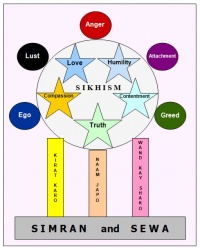Template:Did you know: Difference between revisions
Hari singh (talk | contribs) No edit summary |
Hari singh (talk | contribs) No edit summary |
||
| Line 7: | Line 7: | ||
.... that [[Langar]] is a '''Sikh free kitchen''' which was started by the first [[Sikh Guru]], [[Guru Nanak Dev]] Ji in the fifteenth century. It is designed to uphold the principle of equality between all people of the world regardless of their religion, caste, colour, creed, age, gender or social status. In addition to the ideals of equality, the tradition of Langar expresses the ethics of '''sharing, community, inclusiveness and oneness''' of all humankind. "..the Light of God is in all hearts", said Guru Nanak (sggs 282) | .... that [[Langar]] is a '''Sikh free kitchen''' which was started by the first [[Sikh Guru]], [[Guru Nanak Dev]] Ji in the fifteenth century. It is designed to uphold the principle of equality between all people of the world regardless of their religion, caste, colour, creed, age, gender or social status. In addition to the ideals of equality, the tradition of Langar expresses the ethics of '''sharing, community, inclusiveness and oneness''' of all humankind. "..the Light of God is in all hearts", said Guru Nanak (sggs 282) | ||
<!----------------------------------Disabled ----------------------- | |||
....that '''[[Anand Karaj]]''' is the name given to the [[Sikh]] wedding [[Sanskar|ceremony]], literally translated as "Blissful Occasion". Sikhs regard [[Anand karaj|marriage]] as a sacred bond of mutual dependence between a man and a woman. | ....that '''[[Anand Karaj]]''' is the name given to the [[Sikh]] wedding [[Sanskar|ceremony]], literally translated as "Blissful Occasion". Sikhs regard [[Anand karaj|marriage]] as a sacred bond of mutual dependence between a man and a woman. | ||
| Line 13: | Line 13: | ||
.... that the [[Panj Granthi]] is a [[pothi]] or small book containing five chosen texts, from the [[Guru Granth Sahib]]. The word "[[panj]]" means "five" and "granthi" is the diminutive form of "granth" (holy book) | .... that the [[Panj Granthi]] is a [[pothi]] or small book containing five chosen texts, from the [[Guru Granth Sahib]]. The word "[[panj]]" means "five" and "granthi" is the diminutive form of "granth" (holy book) | ||
.... that [[Alahunian]] is the name given to the [[Bani]] by [[Guru Nanak]]. It is a composition in measure Vadahans in the [[Guru Granth Sahib]] on page Page 578 and refers to a dirge (funeral song) wailingly sung in chorus by women mourning the death of a close relation. Etymologically, the word means an ''"utterance in praise of a departed person"''. | .... that [[Alahunian]] is the name given to the [[Bani]] by [[Guru Nanak]]. It is a composition in measure Vadahans in the [[Guru Granth Sahib]] on page Page 578 and refers to a dirge (funeral song) wailingly sung in chorus by women mourning the death of a close relation. Etymologically, the word means an ''"utterance in praise of a departed person"''. | ||
Revision as of 20:43, 13 December 2007
..... that on the 5 January 2008, the Sikh worldwide will celebrate the 340th anniversary of the birth of Guru Gobind Singh.
.... that Bani (Punjabi (Punjabi: ਬਾਣੀ)) is short for Gurbani (Punjabi (Punjabi: ਗਰਬਾਣੀ)) and is the term used by Sikhs to refer to various sections of the Holy Text that appears in their several Holy Books. These Banis are often found in small Gutkas or Small Books containing sections of Gurbani.
.... that Langar is a Sikh free kitchen which was started by the first Sikh Guru, Guru Nanak Dev Ji in the fifteenth century. It is designed to uphold the principle of equality between all people of the world regardless of their religion, caste, colour, creed, age, gender or social status. In addition to the ideals of equality, the tradition of Langar expresses the ethics of sharing, community, inclusiveness and oneness of all humankind. "..the Light of God is in all hearts", said Guru Nanak (sggs 282)

